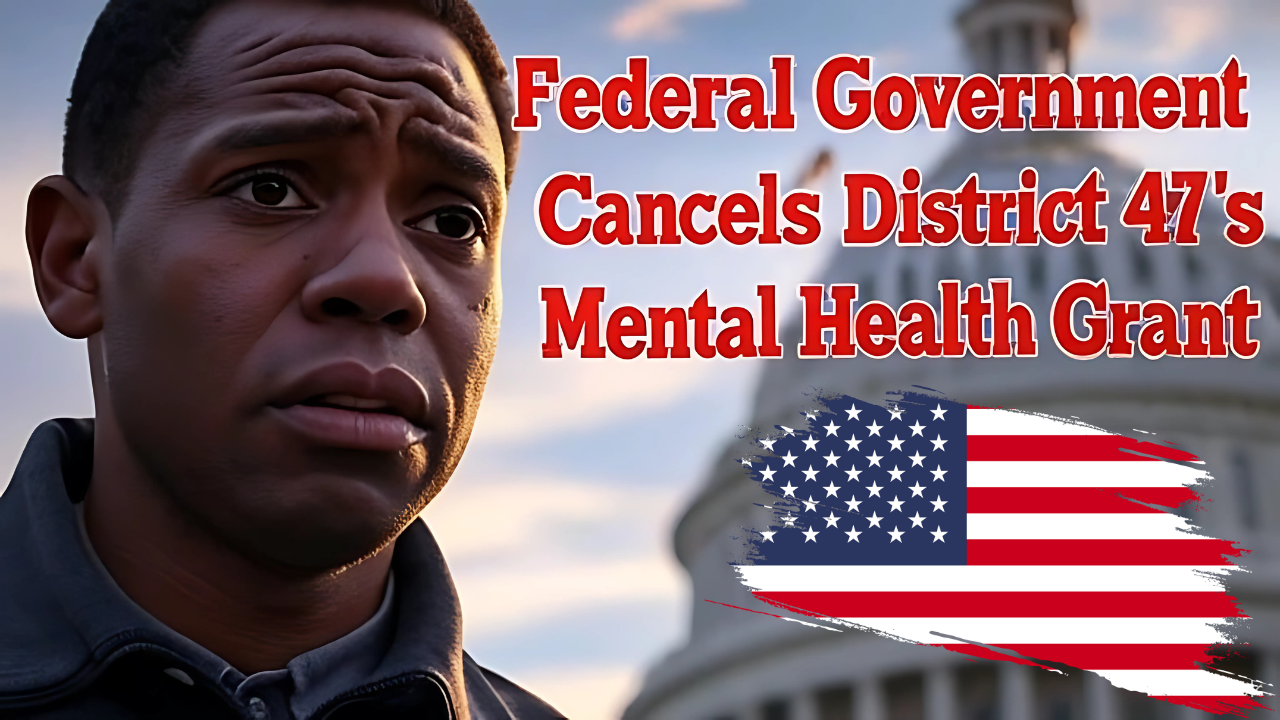Crystal Lake District 47 just received some tough news that has left many parents and educators scratching their heads. The federal government decided to cancel a massive $5.6 million grant that was helping kids get the mental health support they desperately need.
This wasn’t just a small local decision either. The U.S. Department of Education canceled over 100 similar grants across the entire country, affecting nearly a billion dollars in funding that was supposed to help students cope with stress, anxiety, and other mental health challenges.
What Was This Grant All About?
The grant had a pretty meaningful name – Project LAKE, which stands for Learning Acceptance through Kindness for Everyone. It sounds like something any parent would want for their child, right?
This program was created back in 2023 as a direct response to the tragic school shooting in Uvalde, Texas in 2022. The idea was simple: give schools the resources they need to hire more mental health professionals who could help kids before problems got too big to handle.
The Money Trail and What It Paid For
When Crystal Lake District 47 first got this grant, it felt like winning the lottery for student welfare. The $5.6 million was spread out over five years, which meant the district could plan ahead and really make a difference.
With this money, they hired five social workers and six school counselors. They also created a brand-new position called the social-emotional learning director, which went to Kristin Schmidt, who had been working in special education before.
Virtual Mental Health Services
The grant also paid for something pretty innovative – virtual therapy sessions through a company called Daybreak Health. This California-based company provided online mental health services right in the schools.
In just one year, more than 100 students used these services. That’s 100 kids who got help they might not have received otherwise because their families couldn’t afford it or didn’t know where to go.
Real Impact on Real Kids
Think about it from a parent’s perspective. Your child is struggling with anxiety about tests, bullying, or problems at home. Instead of waiting weeks for an appointment with a private therapist, they could talk to someone right at school.
The beauty of having mental health professionals in schools is that they can spot problems early. A school counselor might notice when a normally happy kid starts acting withdrawn or when grades suddenly drop for no obvious reason.
Why Did the Government Cancel These Grants?
Here’s where things get a bit confusing and frustrating for many families. Murray Bessette, a senior advisor in the Department of Education, sent a letter explaining the decision.
According to the letter, these grants “conflict with the priorities of the current administration.” The government claimed the programs violate federal civil rights law and don’t align with their focus on “merit, fairness, and excellence in education.”
The Official Reasoning
The Department of Education said these mental health programs somehow “undermine the well-being” of the students they’re supposed to help. They also called it an “inappropriate use of federal funds.”
Many parents and educators are having trouble understanding this logic. How does helping kids with their mental health undermine their well-being?
Political Changes Behind the Scenes
The letter specifically mentioned that these grants reflected the “prior administration’s priorities” and don’t fit with the current administration’s goals. This suggests the cancellation is more about political differences than actual problems with the programs.
Murray Bessette, who signed the cancellation letter, works on projects related to America 250 and the Presidential Advisory 1776 Commission. These are initiatives focused on patriotic education and American history.
How the School District Is Responding
Superintendent Kathy Hinz had to deliver some disappointing news to families. She sent a letter explaining that while the grant is ending, the district is doing everything possible to minimize the impact on students.
The good news is that all the mental health staff hired through the grant will keep their jobs for the entire 2025-2026 school year. This gives the district time to figure out alternative funding sources.
No Immediate Changes for Students
Parents can breathe a little easier knowing their kids won’t suddenly lose access to mental health support. The district is committed to maintaining these services while they work on a long-term solution.
Kristin Schmidt, the social-emotional learning director, is staying positive despite the setback. She’s been working with families and community members to explore other options for keeping these vital services available.
Working with Other Affected Districts
Crystal Lake District 47 isn’t fighting this battle alone. Seven Illinois school districts received similar grants and are now working together with the Illinois State Board of Education to challenge the decision.
Schmidt calls this a “power in numbers” approach. When multiple districts work together, they have a stronger voice and better chance of getting attention from state and federal officials.
The Bigger Picture: Student Mental Health Needs
This isn’t just about one school district losing money. It’s about recognizing that kids today face mental health challenges that previous generations didn’t experience in the same way.
Social media pressure, academic stress, family problems, and world events all contribute to anxiety and depression among young people. Schools have become a frontline in addressing these issues because that’s where kids spend most of their time.
Why Schools Need Mental Health Support
Teachers aren’t trained therapists, but they’re often the first to notice when a student is struggling. Having professional mental health workers in schools creates a safety net that can catch problems before they become crises.
When kids get the emotional support they need, they do better academically too. It’s hard to focus on math or reading when you’re worried about problems at home or feeling overwhelmed by social situations.
The Uvalde Connection
The original Bipartisan Safer Communities Act that funded these grants was passed after the heartbreaking shooting at Robb Elementary School in Uvalde, Texas. Lawmakers from both parties agreed that schools needed more mental health resources to prevent tragedies.
Now, less than three years later, those same resources are being taken away. This leaves many wondering if we’re moving backward on school safety and student wellness.
Community Response and Next Steps
The Crystal Lake community isn’t giving up without a fight. Schmidt mentioned that the support from parents and community members has been overwhelming and gives her hope for finding alternative solutions.
The district has until the end of May to submit a formal request for reconsideration to the Department of Education. They’re preparing their case carefully, focusing on the positive impact these services have had on students.
Data-Driven Approach
Over the next year, the district plans to continue collecting data on how social-emotional learning affects students. They want to show concrete evidence of improved behavior, better academic performance, and increased student wellness.
This data could be crucial for securing future funding from state sources, private foundations, or even a potential reversal of the federal decision.
Community Involvement
Schmidt is encouraging community members to get involved, but she wants to keep the focus on student needs rather than political arguments. “We just want to do right by kids,” she emphasized.
Local parents, businesses, and organizations might be able to help fund these positions or advocate for continued support at the state level.
What This Means for Other Schools
Crystal Lake District 47 is just one of over 100 school districts nationwide that lost similar funding. This affects schools in rural areas, suburbs, and cities across America.
The total amount of canceled funding approaches $1 billion, which represents thousands of mental health professionals who were helping students every day.
Potential Long-term Consequences
Without adequate mental health support in schools, problems that could be addressed early might escalate into more serious issues. This could lead to higher dropout rates, increased disciplinary problems, and more students struggling academically.
The timing is particularly concerning given that mental health issues among young people have increased significantly since the COVID-19 pandemic.
While the immediate future is uncertain, the Crystal Lake community seems determined to find ways to continue supporting student mental health. Schmidt encouraged people to “stay tuned” as she works on creative solutions.
The district’s commitment to keeping current staff through the next school year provides some stability while longer-term plans are developed.
Frequently Asked Questions
Q: Will students lose their mental health services immediately?
A: No, all services will continue through the 2025-2026 school year.
Q: How many students were using these mental health services?
A: Over 100 students accessed virtual therapy services in the first year alone.
Q: Can the district appeal this decision?
A: Yes, they have until the end of May to request reconsideration from the Department of Education.
Q: Are other Illinois schools affected?
A: Yes, seven Illinois districts received similar grants that were also canceled.
Q: How much money was involved total?
A: Crystal Lake District 47 lost $5.6 million, while nationwide cancellations affected nearly $1 billion in funding.
Q: Who made the decision to cancel these grants?
A: The U.S. Department of Education under the Trump administration, specifically Murray Bessette.
Q: Will the school counselors and social workers lose their jobs?
A: Not immediately – they’ll keep their positions through the entire 2025-2026 school year.
Q: What was the original purpose of these grants?
A: They were created in response to the Uvalde school shooting to improve mental health support in schools.
Q: Can parents do anything to help?
A: Yes, community involvement and advocacy could help find alternative funding sources or support appeals.

